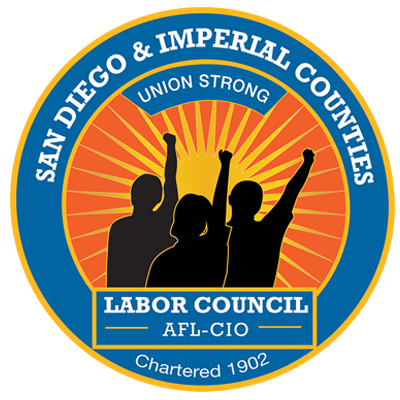By BRIGETTE BROWNING & KEITH MADDOX
We celebrate Labor Day to honor the sacrifices of workers past — whose bravery has led to the creation of the American middle class. These workers fought for and won the first minimum wage, an eight hour workday, life-saving health and safety regulations and protections against workplace discrimination. These workers were members of a union.
Rising costs of living and stagnant wages have led the public to recognize the power of workers standing together. Gallup shows labor union popularity at a 15-year high, with support of unions among millennials 18-34 higher than that of the previous two generations. In the face of tens of millions of dollars invested in campaigns to stymie union organizing, an analysis by the Economic Policy Institute shows that in 2017 unions increased their total membership by more than 200,000.
This resurgence is due to the efforts of union workers both at the bargaining table and beyond it. Labor unions and their members have historically been catalysts for social change — not just in contract negotiations but through their advocacy on the broader issues working people care about.
The transformational “Pullman Strike” of 1894 was as much about confronting unfair rent in company-owned towns as it was about wage cuts. In the 1970s union flight attendants challenging age and weight restrictions aimed to improve not just their own working conditions but those of all women. The sanitation workers in Memphis championed by Dr. Martin Luther King fought for the civil rights and human dignity of African-American workers in every profession.
We see the same spirit of advocacy today.
Union teachers in West Virginia, Arizona and Oklahoma successfully went on strike — not just to make a living wage — but to restore classroom funding for all students after years of draconian cuts.
Union hotel workers and janitors are leading the fight for immigration reform and better safeguards against workplace sexual assault. Union workers of every profession have been instrumental in raising the minimum wage in cities and states across the country.
It is no surprise that people empowered to have a voice in their workplace are frequently the tip of the spear in taking on fights beyond it.
This year, with the full support of its union, The Boston Globe led 350 outlets across the country in support of free press, and the NFL and NBA players associations have proven to be one of the strongest lines of defense of athletes’ and — by extension — everyone’s free speech.
Locally, union workers are also demonstrating their ability to tackle some of our region’s biggest challenges. Nowhere is this more evident than in the fight for housing affordability.
It’s no secret that the cost of housing in the San Diego region is prohibitive. Most San Diegans working full time jobs spend an outsized portion of their income on housing expenses — and many must work multiple jobs to keep a roof over their heads.
San Diego union workers have come together to advocate for policies that would improve housing affordability for all San Diegans. This year, construction tradespeople, hotel workers, domestic workers, school employees and teachers joined firefighters, nurses and workers across industries to protect market rate housing stock from being overrun by vacation rentals, and to fight for increased construction of workforce and affordable housing.
After local leaders failed to do so for years, worker advocates secured vacation rental regulations, and it was workers who forced a conversation on the issue of workforce and affordable housing.
Workers garnered the appointment of a labor advocate to serve on the local housing commission and workers have aggressively pursued multiple avenues to finance housing — from local citizens’ initiatives to state funding.
The power of prioritizing issues that workers care about is also translating to wins at the ballot box.
Labor Council-endorsed candidates had more than an 80 pecent success rate countywide in the June primary — and a 100 percent success rate on endorsed initiatives.
We are ensuring that San Diego will be America’s Finest City for all its residents. We will resurrect the middle class and bring back economic security for hundreds of thousands of our fellow San Diegans. Join us.
Browning is president, UNITE-HERE Local 30 and executive vice-president, San Diego & Imperial Counties Labor Council. Maddox is executive secretary-treasurer, San Diego & Imperial Counties Labor Council.
